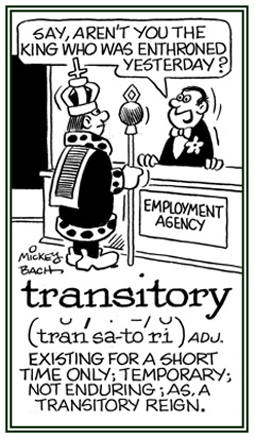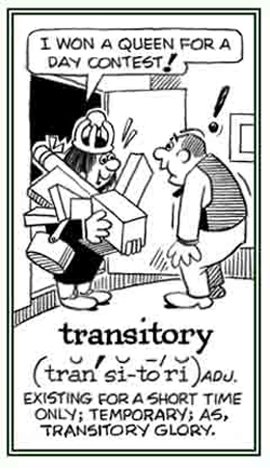trans-, tran-, tra-
(Latin: across, through, over, beyond; on the far side of)
Don't confuse the tra- in this element with another tra- in "drag" or "draw". Trans- becomes tra- before the consonants -d, -j, -l, -m, -n, and -v.
2. Not lasting for ever; not permanent, nor eternal: The community had a transitory existence because of the lack of proper or sufficient housing.
All living creatures obviously have a transitory existence.


Go to this Word A Day Revisited Index
so you can see more of Mickey Bach's cartoons.
2. Susceptible of being converted or reconstructed into another substance; transformable: The ideas that Jim had could be translatable into a real tangible and useful device, and so he wrote all his ideas down!
George, can you translate this list of measurements from Imperial measurements into Metric measurements, please?
2. To move or to change either a physical location or the appearance of something: The king agreed to translate his court from the city to the country estate of his friend.Mark's friend slowly started to translate from being a simple country boy into an active city guy.
3. To explain or to interpret: Mary, would you like Mark to translate that complicated legal document into plain English?The most important aspect of Translational Research is the working from the laboratory to the clinic, and from the clinic back to the laboratory.
Translational Scientific Research is, therefore, an inherently collaborative and interdisciplinary area of medical research.
Special information about Transitional Scientific Research is available here.
The deer in the forest had to be translocated because a construction company was going to cut down all of the trees in order to build a shopping complex.
2. Etymology: from Latin trare, "to cross" + locatio, "a placing" + -ation, "act or state of".
The translucence of the frosted window in the front door prevented the woman from seeing who was ringing the doorbell.
2. Easily understandable; lucid: Marjory gave her friends an explanation of great translucence that was very easy to understand.3. Clear; transparent: The biologists could see that the translucence of the seawater was decreased by the storm.
4. The action or fact of shining through, mentally or physically: Siebert had a moment of translucence when all the facts of the criminal case were provided and he knew he could solve the mystery.
Although transparency usually refers to visible light in well-known phrases, it can also refer to anything that can be easily seen; for example, there is translucency of soft tissue with X-rays, while there are no translucencies with the humerus, collarbone, breastbone, etc.
Ted's new door had several glass panes; including, three that were translucencies which allowed brightness to filter through, but they didn't provide a clear view of what was outside.
Frosted glass is an example of another translucent product.


